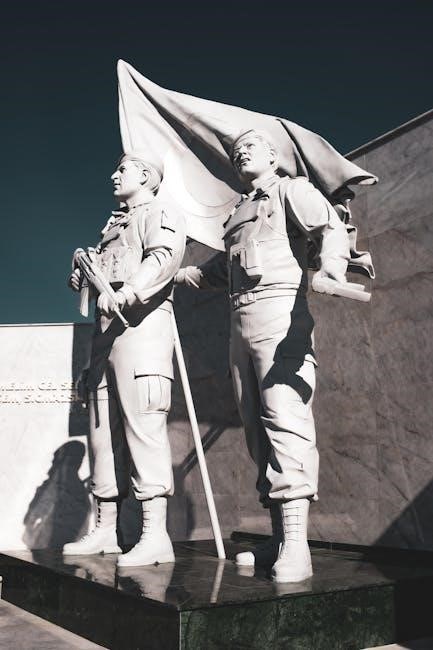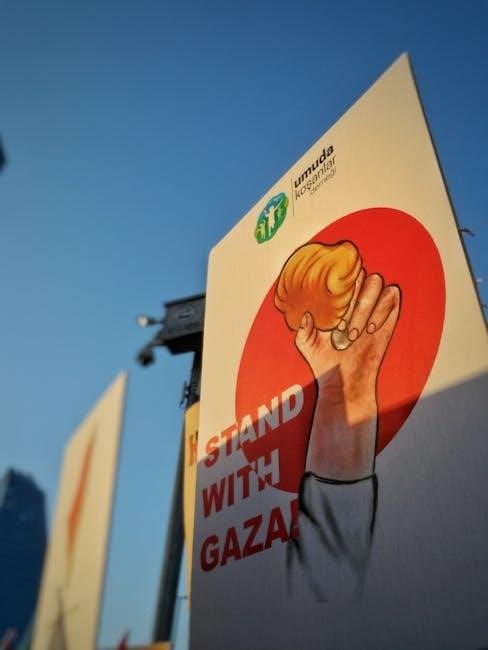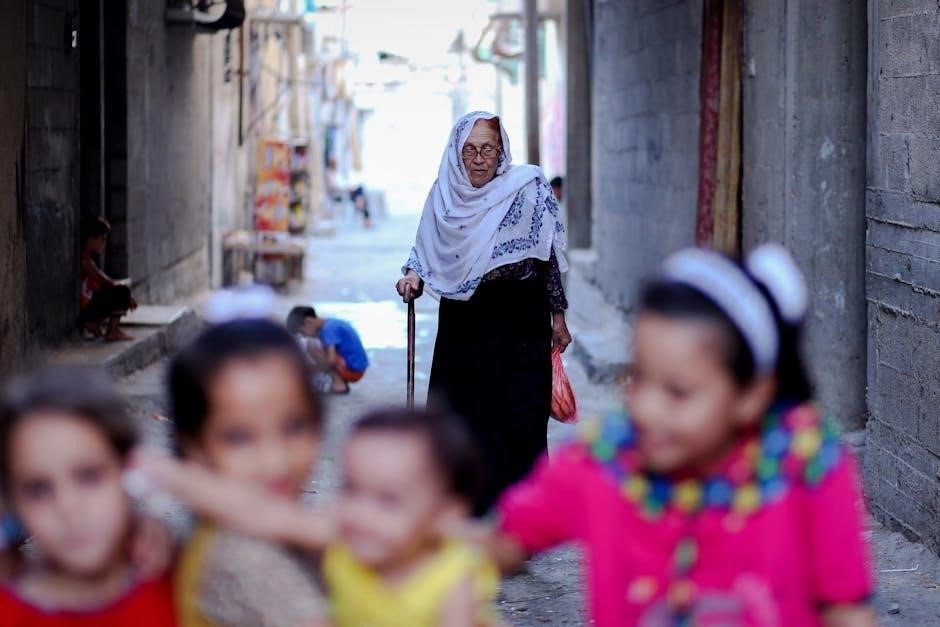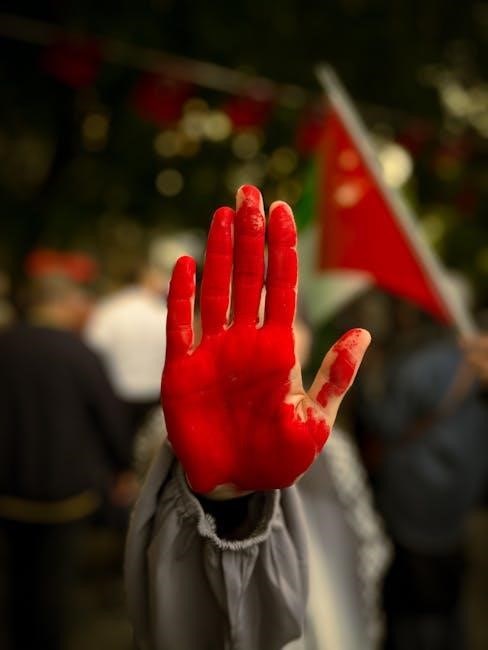gaza an inquest into its martyrdom pdf

In Gaza: An Inquest into Its Martyrdom, Norman Finkelstein presents a meticulously researched analysis of Gazas suffering under Israeli occupation, offering a searing indictment of policies and their human cost.
Overview of the Book and Its Significance
Gaza: An Inquest into Its Martyrdom by Norman Finkelstein is a deeply researched and critical examination of Israel’s treatment of Gaza, offering a searing indictment of decades of occupation. Published by the University of California Press, the book meticulously documents the humanitarian crises, military assaults, and legal implications of Israel’s policies. Finkelstein’s expertise in Middle Eastern politics and human rights law provides a unique perspective, challenging prevailing narratives and advocating for justice. The book is significant for its comprehensive analysis, drawing on historical events, legal frameworks, and eyewitness accounts. It serves as a vital resource for understanding the conflict’s moral and legal dimensions, making it a powerful contribution to the discourse on Gaza’s plight.
Norman Finkelstein: The Author and His Expertise
Norman Finkelstein, a renowned American political scientist and activist, is a leading authority on the Israeli-Palestinian conflict. His extensive research and advocacy have earned him international recognition. With a Ph.D. in political science from Princeton University, Finkelstein has authored numerous influential books on Middle East politics and human rights. His critical approach challenges mainstream narratives, often highlighting the plight of Palestinian civilians under occupation. Finkelstein’s expertise in international law and his meticulous documentation of historical events provide a solid foundation for his arguments. His work has been praised for its depth and moral clarity, making him a key voice in the discourse on Gaza’s situation.

Historical Context of Gaza
Gaza’s history dates back to ancient times, with its strategic location making it a contested region. From Egyptian rule to Ottoman dominance, Gaza has been shaped by various empires.
The Israeli-Palestinian Conflict: Key Events and Impact
The Israeli-Palestinian conflict is rooted in competing claims to the same land, with key events shaping Gaza’s fate. The 1948 Nakba, or “catastrophe,” displaced Palestinians, while the 1967 Six-Day War led to Israel’s occupation of Gaza. The First Intifada (1987–1993) and the Oslo Accords (1993) aimed to resolve the conflict but failed to achieve lasting peace. Recent wars, such as the 2008-2009 and 2014 conflicts, caused massive civilian casualties and infrastructure destruction. These events have entrenched Gaza’s humanitarian crisis, with ongoing blockades exacerbating poverty, displacement, and loss of life. The conflict remains unresolved, fueling cycles of violence and instability in the region.

Gaza’s Strategic Importance in the Middle East
Gaza’s strategic significance stems from its location on the Mediterranean coast, bordering Egypt and Israel. Its proximity to key trade routes and natural resources makes it a focal point for regional power dynamics. Historically, Gaza has been a crossroads for civilizations, making it a contested territory. Its access to the sea and potential for offshore gas reserves heighten its geopolitical value. The dense population and ongoing humanitarian crisis further draw international attention, making Gaza a symbol of resistance and oppression. Its strategic importance is compounded by its role in regional conflicts, influencing relations between Israel, Egypt, and other Middle Eastern states.


The Israeli-Palestinian Conflict
The Israeli-Palestinian conflict is a longstanding dispute over land, identity, and sovereignty, deeply rooted in historical narratives and competing claims to the region.

Major Wars and Their Impact on Gaza
Major wars, such as the 2008-2009 Operation Cast Lead and the 2014 Gaza War, have devastated Gaza, causing widespread destruction and civilian casualties. These conflicts, marked by intense military campaigns, have led to significant loss of life, displacement, and long-term humanitarian crises. The 2014 war alone resulted in over 2,000 Palestinian deaths and the destruction of critical infrastructure. Finkelstein highlights how these wars have been framed as self-defense by Israel, while emphasizing the disproportionate impact on Gaza’s civilian population. The ongoing blockade and repeated military assaults have deepened Gaza’s isolation and exacerbated its humanitarian emergency, as documented in Finkelstein’s in-depth analysis.
The Role of Hamas and Its Perception Internationally
Hamas, a Palestinian Islamist group, plays a central role in Gaza’s resistance against Israeli occupation. While it governs Gaza and advocates for Palestinian rights, its methods, including rocket attacks, have drawn international condemnation. Many Western nations label Hamas as a terrorist organization, while others in the Middle East and beyond view it as a liberation movement. Finkelstein examines how Hamas’s actions are perceived globally, highlighting the divide between supporters who see it as a defender of Palestinian sovereignty and critics who condemn its tactics. The group’s influence in Gaza’s political landscape and its impact on the Israeli-Palestinian conflict are key themes in Finkelstein’s analysis, which critiques both Hamas’s strategies and Israel’s response.
An Inquest into Gaza’s Martyrdom

Gaza: An Inquest into Its Martyrdom examines the region’s suffering and resilience, presenting a meticulous exploration of its martyrdom through historical and humanitarian lenses.
Finkelstein’s Central Argument and Evidence
Norman Finkelstein’s central argument in Gaza: An Inquest into Its Martyrdom posits that Israel’s actions in Gaza are driven by a desire to maintain control and suppress Palestinian resistance, rather than self-defense. He meticulously examines historical events, including military operations, and uses evidence from UN reports, eyewitness testimonies, and legal documents to challenge Israel’s narrative. Finkelstein argues that the devastation inflicted on Gaza is disproportionate and amounts to collective punishment, violating international law; His evidence highlights the humanitarian toll, with a focus on civilian casualties and displacement, presenting a compelling case for accountability and justice.
Humanitarian Crisis: Casualties and Displacement
Gaza has endured immense suffering, with recurring conflicts causing widespread casualties and displacement. Finkelstein’s book documents the devastating impact on civilians, including high rates of child mortality, injuries, and psychological trauma. The blockade has exacerbated poverty and limited access to basic necessities, creating a dire humanitarian situation. Displacement within Gaza and beyond has disrupted lives, leaving many without homes or livelihoods. The book highlights the long-term effects of these crises, emphasizing the urgent need for international intervention and accountability to address the ongoing violations of human rights and international law in the region.
International Response and Legal Implications
The international community’s response to Gaza’s crises has been divided, with calls for accountability and justice often overshadowed by political agendas and diplomatic immunity for Israel.
War Crimes Allegations and the ICC’s Role
The International Criminal Court (ICC) has faced mounting pressure to investigate alleged war crimes in Gaza, particularly during Israel’s 2014 assault. Norman Finkelstein argues that Israel’s actions, justified as self-defense, violate international law. The ICC’s potential probe into these atrocities could set a precedent for accountability. However, political interference and diplomatic immunity often hinder such investigations. Finkelstein’s work underscores the need for impartial legal scrutiny to address the humanitarian crisis. The ICC’s role remains crucial in determining the legality of Israel’s actions and ensuring justice for Gaza’s victims, despite the challenges posed by geopolitical dynamics and lobbying efforts to block accountability.
Global Reactions and Political Implications
Finkelstein’s book has sparked widespread international debate, drawing attention to Gaza’s plight and its broader political ramifications. Global reactions highlight the polarization of opinions, with many hailing the work as a bold exposé of human rights abuses, while others criticize it for its sharp critique of Israeli policies. The book has reignited discussions about the Israeli-Palestinian conflict, influencing public opinion and advocacy efforts worldwide. Politically, it has pressured governments to reevaluate their stance on the conflict, with some calling for stronger diplomatic interventions. The revelations in the book have also fueled grassroots movements, emphasizing the need for accountability and justice in the region. Its impact continues to resonate globally, shaping both public discourse and policy debates.
Norman Finkelstein’s work delivers a powerful critique of Gaza’s martyrdom, reshaping narratives and demanding accountability. His analysis leaves an enduring impact on scholarship and advocacy for justice.
The Book’s Impact on the Understanding of the Conflict
Gaza: An Inquest into Its Martyrdom reshapes narratives about the Israeli-Palestinian conflict, offering a searing critique of Israel’s policies and their devastating impact on Gaza. Finkelstein’s meticulous research challenges dominant narratives, exposing the imbalance of power and the humanitarian toll of occupation. By presenting overwhelming evidence, the book forces readers to confront uncomfortable truths about Gaza’s suffering. Its impact lies in its ability to spark critical discussions, urging international accountability and highlighting the urgent need for justice. As a scholarly and advocacy landmark, the book remains a vital resource for understanding Gaza’s plight and advocating for Palestinian rights in the face of ongoing conflict.
Finkelstein’s Legacy in Advocacy and Scholarship
Norman Finkelstein’s Gaza: An Inquest into Its Martyrdom solidifies his legacy as a fearless advocate for Palestinian rights and a rigorous scholar. His work challenges mainstream narratives, advocating for justice and accountability. Through meticulous research and moral clarity, Finkelstein has become a pivotal voice, influencing both academic discourse and public awareness. His commitment to uncovering truths about Gaza’s suffering has left an indelible mark on the field of Middle Eastern studies. Finkelstein’s legacy is defined by his unwavering dedication to scholarship and activism, ensuring that the plight of Palestinians remains a central focus of international discussion and advocacy efforts.
Leave a Reply
You must be logged in to post a comment.